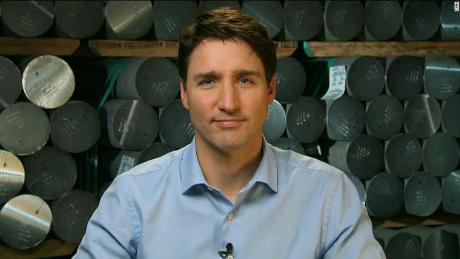Washington (CNN)Canadian Foreign Minister Chrystia Freeland said the US decision to slap tariffs against Canada on national security grounds was "absurd" and that her country was moving forward "more in sorrow than in anger" with retaliatory tariffs.
Speaking in Washington, Freeland also offered some pointed words when asked about insults that senior White House staffers have hurled at Prime Minister Justin Trudeau: "The government of Canada does not believe that ad hominem attacks are the right way to go about foreign policy, to go about foreign relations, particularly when it comes to foreign relations with your close allies and neighbors."
She noted that the Canadian Parliament unanimously backed a resolution condemning the language and observed, "It's very nice to represent a united country."
Freeland was in Washington on a trip planned long before the relations between the two allies veered wildly and unexpectedly off course after President Donald Trump attacked Trudeau last weekend as "very dishonest and weak," and White House trade adviser Peter Navarro declared there was "a special place in hell" for the Canadian leader after he announced Ottawa's decision to apply retaliatory tariffs.
Freeland's visit is part of a broader Canadian effort to underscore the importance of the US-Canada relationship and particularly their trade ties -- an effort that began even before Trump took office.
Wary of Trump's rhetoric about NAFTA, Canadian officials at all levels of government have been reaching out to counterparts in statehouses, governors' offices, business and the tech community, as well as on Capitol Hill, to stress the importance of the trading relationship.
Apart from being close security allies -- sharing the defense of North America through the North American Aerospace Defense Command and the trans-Atlantic through NATO -- the two countries are each other's largest trading partners, exchanging goods and services that support millions of jobs in each country.
The Trump administration's justification for tariffs on national security grounds "is, frankly, absurd," Freeland said, speaking at the US Capitol after a meeting with senators. "The notion that Canadian steel and aluminum could pose a national security threat to the United States -- I think Americans understand it is simply not the case."
Freeland added that the action is illegal under World Trade Organization and NAFTA rules, that Canada has raised cases in both tribunals with the backing of the European Union and Mexico, and that "the United States, in fact, has a surplus of trade in steel with Canada."
"Canada has therefore announced, truly more in sorrow than in anger, announced a perfectly reciprocal, measured, dollar for dollar retaliation response" that will come into effect July 1, Freeland said, before adding that "we really are confident that at the end of the day common sense will prevail."
Transcending personality politics
Michael Byers, a professor of international politics at the University of British Columbia, said that despite the current turbulence, the US-Canada relationship "transcends any president or prime minister."
"We'll continue to have one of the world's largest trading relationships, the world's largest undefended border. We're partners in the defense of North America," he said. "Will NAFTA negotiations continue? Of course, because both countries need that to happen. Will the defense relationship continue? Of course, because both countries need that to happen."
"I see these short-term tensions against the backdrop of a long-term relationship," Byers said.
Canadian officials say they've been working very deliberately to emphasize shared interests and have been doing so for some time.
They said the country's leaders have been reconsidering their approach to the US because the Trump campaign was so vocal in its criticism of the North American Free Trade Agreement, and that the issue was of concern across the Canadian political spectrum.
'Not getting into a tit-for-tat'
Across the board -- whether it's a government, business or security leader visiting the US -- Canadian officials have been touting the importance of the US-Canada trade relationship, reaching out beyond the administration to Congress, statehouses and legislators.
"The whole approach has comprehensively changed by necessity, and it's one that's holistic and nonpartisan," said one official. "This is too big an issue to be partisan about."
That official and others said US governors, state officials and lawmakers have a strong appreciation of the benefits of trade with Canada. "We have no problem finding people to talk to because this is a huge national interest for them," the official said.
Even the Prime Minister has made an effort to reach out to Congress. In October, Trudeau became the first Canadian prime minister to meet with the House Ways and Means Committee.
At the administration level, the official said, Canadians concentrate on data in the face of some of the President's mischaracterizations of the trade relationship. "We stick to the facts," the officials said, adding that there's also an effort to focus on "persistence and not getting into a tit-for-tat."
Freeland was on the Hill to speak to members of the Senate Foreign Relations Committee, where she got the backing of senators, who stressed the shared military sacrifice Canadians have made alongside US troops, security cooperation and the deeply intertwined economic ties.
Sen. Bob Corker, the Tennessee Republican who chairs the Foreign Relations Committee, said that "you'd have to be not paying attention to know that we've damaged relations" with Canada. Asked about the tariffs, he said, "I don't know of any senator that hasn't expressed concerns about what is happening and just sort of the random nature of what is happening."
The top-ranking Democrat on the committee, Sen. Robert Menendez of New Jersey, noted that the two countries share "the longest, most peaceful border in the world."
"This is a critically important ally to the United States, and you don't give the back of your hand to some of our closest allies," he said, adding that he understood why Canada would be insulted that "America, their closest ally, would suggest that it is a national security threat."








